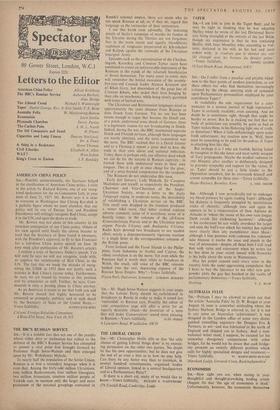THE BBC'S RUSSIAN SERVICE
SIR,—It is a notable fact that not one of the pundits whom either duty or inclination has rallied to the defence of the BBC's Russian Service has attempted to answer a vital point first brought forward by Professor Hugh Seton-Watson and then enlarged upon by Mr. Wolodymyr Mykula. To nearly half the population of the Soviet Union, Russian is at best a secondary language when it is even that. Among the forty-odd million Ukrainians, nine million Byelorussians, four million Georgians, two million Armenians, nineteen million people of Turkish race, to mention only the larger and more prominent of the national groupings contained in Russia's colonial empire, there are many who do not speak Russian at all, or, if they do, regard this language as the vernacular of their tormentors,
I use this harsh term advisedly. The sickening details of Stalin's campaign of murder by famine in the Ukraine during the Thirties are not forgotten. Nor is the more recent and equally bloodthirsty explosion of vengeance perpetrated by Khrushchev and Kolpak against the remnants of the Ukrainian Insurgent Army.
Episodes such as the extermination of the Chechen, lngush, Karachay and Crimean Tartar races have combined to create an unfavourable impression of the Russians in the minds of the reluctant beneficiaries of Soviet humanism. For many years to come, men will remember the bestial execution of the seventy- five-year-old Cossack leader Ataman Krasnow and of Khan Gircy, last descendant of the great line of Crimean Khans, who ended their lives hanging by their ribs on meathooks, while being slowly garrotted with loops of barbed wire.
The Ukrainian and Byelorussian languages stand at approximately the same distance from Russian as does Dutch from German. Yet no one has been insane enough to argue that because the Dutch can, at a pinch, understand some shreds of German. there is a legitimate reason for not broadcasting in Dutch. Indeed, during the war, the BBC maintained separate Dutch and Flemish services, although these languages are nearly identical, and the news transmitted was the same. The BBC realised that to a Dutch listener and to a Fleming it meant a great deal to hear the truth in their own idiom and national inflection. Today there is perhaps only one effective deed which we can do for the nations in Russian captivity : to furnish them with undoctored news in their own tongues. This is a gift at once cheap for the giver, and of a price beyond computation for the recipient.
The Russians do not undervalue this issue.
Early last January, Lady Hesketh, Sir Compton Mackenzie and myself, as respectively the President, Chairman and. Vice-Chairman of the Anglo- Ukrainian Society, wrote a letter to the Daily Telegraph urging, in moderate terms, the desirability of establishing a Ukrainian service on the BBC. This small coin dropped in the fountain produced a minor tidal wave. Our letter evoked copious adverse comment, some of it scurrilous, some of it heavily ironic, in the columns of the all-Union Kontsomolskaya Pravda and in the Ukrainian party organs Pravda Ukrainy and Radianska Ukraine. Radio Kyiv devoted two broadcasts to our modest effort, surely a disproportionately vigorous reaction to a single letter in the correspondence columns of the British press.
From Iceland and the Faroe Islands to the Philip- pines, from Indonesia to Arabia and Cyprus, the ethnic revolution is on the move. Yet even while the Russians find it worth their while to broadcast in Welsh, the small, still voice of the BBC remains hushed over the vast, depressing expanse of the Russian Slave Empire. Why'?—Yours faithfully, Pixton Park, Dulverton, Somerset AUBERON HERBERT






























 Previous page
Previous page